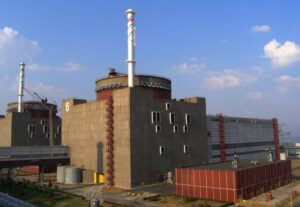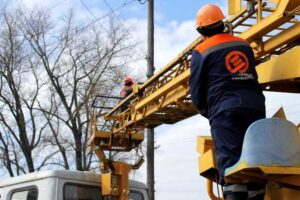
Ukrzaliznytsia received 2,000 tons of high-tech R-65 rails from Japanese manufacturer Nippon Steel, with another 1,000 tons expected to be delivered by the end of January, according to a press release from the Ministry of Community and Territorial Development on Thursday.
According to the release, this cooperation was made possible within the framework of the third phase of the emergency recovery program through the Japan International Cooperation Agency (JICA).
“This was the result of systematic interaction and successful agreements with Japanese partners on the part of the Ministry in early 2025. Ukraine currently does not have its own rail production, so attracting partner support is necessary and crucial for the functioning of the Ukrainian railway,” the ministry emphasized.
It is noted that the cooperation currently involves the transfer of 3,000 tons of rails for a total amount of about $4 million.
The ministry specified that railway workers use mobile complexes to weld rails directly on the tracks and thermally join joints, resulting in the creation of a so-called “velvet track” without joints, which increases its service life and ensures smooth train movement.
“We are sincerely grateful to the Government of Japan for its strategic support, which allows us not only to maintain the network, but also to carry out major repairs in accordance with the highest international standards, ensuring reliable connections even in the most difficult times,” said Marina Denisyuk, Deputy Minister of Community and Territorial Development, in a press release.
The Ministry of Development recalled that support from the Japanese government and JICA has continued since the beginning of the full-scale invasion by the Russian Federation. In particular, during this period, almost 25,000 tons of rails have been delivered, which has made it possible to renovate more than 193 km of tracks on strategic routes of the Lviv, South-Western, Dnipro, Southern, and Odesa railways.
In addition, railway workers also received 24 units of construction and loading/unloading equipment from Komatsu, Toyota, and Sonalika, 22 of which were track equipment, and the total cost of equipment and materials supplied during the first two phases of the program exceeded $42 million, the agency noted.
“The delivered equipment, namely wheel excavators, loaders, and bulldozers, has already worked more than 13,000 motor hours on emergency repair work,” the agency emphasized.

The Kryvyi Rih Mining and Metallurgical Plant PJSC ArcelorMittal Kryvyi Rih (AMKR, Dnipropetrovsk region) continues to restore the operational capacity of locomotives in railway workshop (RW) No. 2 under the GAP-III high-risk equipment repair program.
According to materials in the corporate publication Metallurg, the TEM2U-8679 diesel locomotive was recently repaired, becoming the fifth locomotive to be restored under the GAP-III repair program. The repaired diesel locomotive was put back on the rails at the end of 2025.
It is specified that five locomotives were repaired at Repair Center No. 2 under this program during the full-scale war. The purpose of these repairs is to improve the technical condition, accident-free operation, and ensure the stable operation of locomotives used for the company’s rail transportation.
The first locomotive repaired under this program was the TEM2-2203, manufactured in 1970, and the last of the five repaired locomotives was the TEM2U-8679. Specialists from ZC No. 2 and a contractor replaced the diesel engine parts, cooling sections, and wheel sets on the TEM2U-8679 locomotive, repaired the electrical equipment and cable and wire parts, installed a new battery, and worked on restoring the compressor to working order, etc.
In the future, it is planned to install modern equipment, American engines, control systems, and crew compartments on the locomotives.
ArcelorMittal Kryvyi Rih is the largest producer of rolled steel in Ukraine. It specializes in the production of long products, in particular, rebar and wire rod.
ArcelorMittal owns Ukraine’s largest mining and metallurgical complex, ArcelorMittal Kryvyi Rih, and a number of small companies, including ArcelorMittal Beryslav.

Important repair work has begun on power lines near the Russian-occupied Zaporizhzhia NPP following another local ceasefire brokered by the IAEA, the agency said in a post on social media on Sunday.
“Grossi thanks both sides for agreeing to this new temporary ‘window of silence’ to restore power transmission between the ZNPP and Zaporizhzhia Thermal Power Plant distribution stations, which will help strengthen nuclear safety,” the agency wrote.
It is noted that the IAEA team is monitoring the repair work, which is expected to take several days.
Since the start of the Russian occupation on March 4, 2022, the ZNPP has repeatedly experienced complete and partial blackouts due to the loss of all power lines (it receives electricity from the Ukrainian power grid), with the launch of emergency diesel generators and safety systems, the failure of which could lead to an emergency situation.
According to the IAEA, before the war, the ZNPP had 10 power lines — six at 750 kV and four at 330 kV. The largest nuclear power plant in Europe, which has six 1 GW units, has not been producing electricity since September 11, 2022, following the occupation.
The issue of the ZNPP is one of the problematic ones in the negotiations on the possibility of a peace agreement between Ukraine and Russia, mediated by the US. According to Ukrainian President Volodymyr Zelenskyy, Washington is proposing that the plant in the currently occupied city of Enerhodar in the Zaporizhzhia region be jointly managed by the US, Ukraine, and Russia in a 33%:33%:33% split, while Ukraine is proposing that the plant be operated by a joint venture consisting of 50:50%
IAEA, POWER LINE, REPAIR, truce, ZNPP

The total volume of repairs carried out by JSC Khmelnytskoblenergo over nine months of 2025 amounted to UAH 76.3 million, according to the distribution system operator in the Khmelnytskyi region.
According to Sviatoslav Kozlenko, head of Khmelnytskoblenergo, as quoted in the company’s Facebook post, the company’s priority is to introduce modern equipment and technologies that allow it to automatically localize damaged sections of the network and instantly reconnect consumers from backup lines, which is a key element of a reliable and modern distribution system.
According to the post, approximately 700 transformer substations and distribution points were repaired, which is twice the planned volume and became an important part of the preparation for the winter season.
In addition, OSR specialists also repaired, in particular, 262 6-20 kV power transformers, 972 km of overhead power lines, including replacing 1,206 poles and nearly 6,000 insulators with new ones, restored 299 damaged 0.4-10 kV cable lines, and cleared 2,683 km of power line routes of branches.
It is noted that more than 150 km of modern self-supporting insulated wire was installed on 0.4-20 kV lines, which significantly reduces the risk of short circuits, and 2,291 insulated inputs to residential buildings were installed. Also, according to the company, 29 modern vacuum circuit breakers were installed instead of the planned 3, more than 2,050 voltage limiters instead of the planned 600, and 29 relay protection and automation devices.
“The volume of work for the first three quarters of 2025 exceeded the planned volume by 10-15%,” Khmelnytskoenergo specified.
The company noted that some of the equipment—transformers, circuit breakers, insulators, and cable and wire products—was provided to the enterprise by international donors, including through the Energy Support Fund of Ukraine.
As reported, JSC Khmelnytskoblenergo, 70% of whose shares are owned by the state, is part of the state-owned group JSC Ukrainian Distribution Networks.

The boiler room of Kryvyi Rih Thermal Power Plant, which provides heat to more than 345,000 residents of the northern part of the city, is undergoing major repairs in preparation for the heating season.
“The company’s specialists are replacing the steam superheaters of two steam boilers that have been in operation for 80 years. The installation of convective packages on water boilers is also underway, which will allow the necessary temperature regime of the coolant to be maintained even in severe frosts,” according to a statement on the website of Kryvyi Rih Thermal Power Plant, which is managed by Naftogaz Group.
The statement notes that modern energy-efficient pumps manufactured in Germany will also be installed, which will be responsible for high-quality water treatment and stable water chemistry.
At the same time, the thermal power plant is preparing other facilities for winter – currently, major repairs are being carried out on 10 boilers throughout the city.
As reported, Deputy Prime Minister for Recovery and Minister of Community and Territorial Development Oleksiy Kuleba noted that as of mid-September, the readiness level of the heating network pipelines of Kryvorizhteplocentral JSC is approximately 60%, but all necessary work will be completed before the start of the heating season. He specified that more than 100 repair and restoration teams are currently involved in replacing heating networks, and work is being carried out first and foremost in areas of damage where hydraulic tests need to be conducted.

DTEK Energy’s machine builders manufactured and repaired 2,050 pieces of mining equipment in January-August this year, including six new roadheaders, according to the company’s press release. In addition, 1.7 million spare parts and components were manufactured.
“We continue to consistently strengthen the reliability of thermal power generation in wartime conditions,” DTEK Energy CEO Alexander Fomenko is quoted as saying in the statement.
The press release notes that the company’s machine builders have recently begun serial production of Ukrainian electric motors for GSO, which completely replace expensive imported equipment.
The new motors, with a capacity of 75 to 200 kW, are designed for cleaning combines, belt conveyors, and pumping stations.
“They have already received certificates for climate compliance and explosion protection. In terms of quality, they are a full-fledged analogue of expensive foreign equipment. But now they are Ukrainian and more affordable. This result is the culmination of three years of work by machine builders,” the statement said.
As reported, in the first half of 2025, DTEK Energy invested UAH 2.9 billion in Ukrainian coal mining, and in 2024, investments in Ukrainian mines amounted to about UAH 7.5 billion, and over the last three years (2022-2024) – UAH 18 billion.
Since the beginning of this year, DTEK Energy miners have put seven new coal seams into operation. DTEK Energy provides a closed cycle of electricity production from coal. The company’s installed capacity in thermal generation as of January 2022 was 13.3 GW.
A complete production cycle has been created in coal mining: coal extraction and enrichment, machine building, and maintenance of mining equipment.